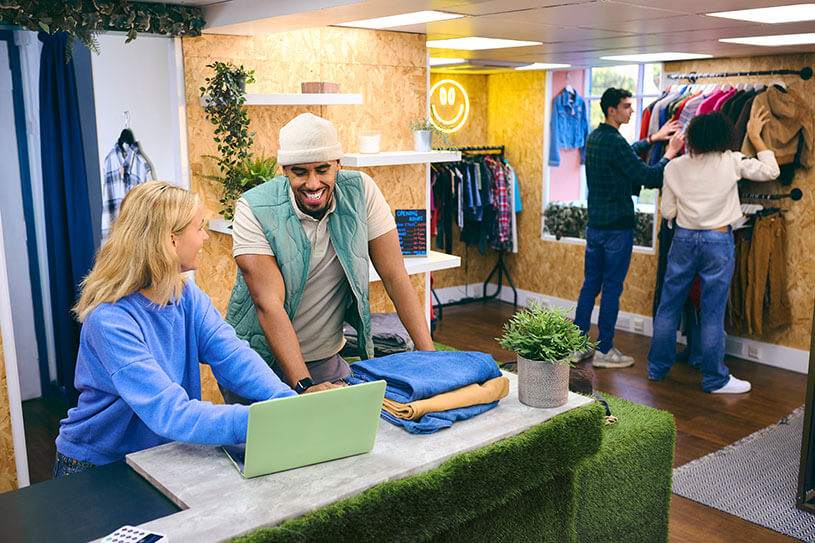Pop-up shops are becoming increasingly popular on UK high streets as many traditional brick-and-mortar stores are forced to close. The idea of pop-ups is that they’re designed to be temporary and can be a great way to introduce a new product to market or bring your online business to new customers.
Could your small online shop use a pop-up to grow the business further? Whether you sell beauty products, artisan gifts, clothes, or food and drink, a pop-up can be a way to create excitement around your business.
This guide explains how to start a pop-up shop along with some real-life stories from small businesses that have done just that. We also have a separate guide on setting up a market stall if you’d rather do that.
What is a pop-up shop?
A pop-up shop is a temporary retail business that appears in a space for a set period of time. It can be a matter or days, weeks, or longer. But the idea is that it’s always going to be temporary so it can be a great way to test out a concept without the commitment of a long-term lease.
A pop-up shop is an alternative to leasing or buying a commercial business premises, which comes with higher costs, risks, and commitment.
Pop-up shop ideas
Many different products can sell successfully in a pop-up shop, but popular ideas include:
- food and drink
- clothes
- candles and gifts
- art and crafts
- beauty
- jewellery
The time of year can also influence sales and trends. For example, gifts, decorations, and candles are often popular at pop-ups during the festive period. Looking for more inspiration? We have a general guide to small business trends too.
Pop-ups as a marketing tool
The continuing challenges of the UK economy have seen retail shops struggling. But online shops are seeing opportunities in the empty shops left on the high street.
This is known as ‘O-2-O’ (online to offline) among retailers, according to a report by the BBC. The same article suggested that the number of UK pop-up shops grew by 18 per cent in 2023.
And it’s possible to use this trend to your advantage.
Michelle, owner of Mama Chen’s in London, said: “Pop-ups are one of the best ways to showcase your brand and what you have to offer. You never know who might be at your pop-up, and it’s a fantastic way to speak to your customers, grow your community and increase your social media following.”
Pop-ups can lean into the scarcity marketing principle, which uses a psychological concept of ‘fear of missing out’ to get people to part with their cash. The fact that you’ll be on the high street for such a short period of time can encourage people to act now so they don’t miss out.

Mama Chen’s dumplings at a pop-up shop in London. Photo credit: Mama Chen’s
‘Solidifies the community-led aspect’
Lucy, owner of Partner in Wine, said: “Pop-ups, if you can make them work for you, are a great way of meeting your customers. I’ve met loads of my customers at pop-ups I’ve done in the past, and it solidifies the community-led aspect of my business.
“Meeting people in person and sharing your story with them means they are less likely to forget you and more likely to become a brand advocate, sharing your story with others long after they’ve left.”
Read more: How to boost your brand – tips from a business owner
Regenerating UK high streets
Towns and cities across the country are looking at ways they can bring footfall back to the high street after the pandemic.
For example, Portsmouth Pop-Up is set to launch in spring 2024 as a way to support business growth in the city. Businesses can trade in a high street location for a minimum of six weeks without the commitment and cost of leasing for a longer period of time.
Councillor Steve Pitt, leader of the council, said he hopes the scheme will “encourage creativity and innovation and support local start-ups, entrepreneurs, and small businesses to grow by providing them with an opportunity to trial business concepts in a low-risk environment.”
Meanwhile in Brighton, Dukes Lane is home to a mix of permanent retail shops and space for pop-ups. Current small businesses trading there include a jewellery maker and wedding dress shop.
And even second-hand businesses are getting in on the idea. Depop partnered with rental agency Sook in 2023 to give sellers the chance to reach people in six temporary locations across the country.
Sarah Jordan, founder of Y.O.U underwear has a shop in Oxford, but that started as a pop-up opportunity through a local council initiative to revive the city centre after the coronavirus pandemic.
“It was something we never thought possible, but being able to try out a space on a short-term basis was a great way to get started and see how it worked”, she explains.
Sarah shares how pop-ups have helped to increase awareness of her shop:
“They get you out in front of customers you may not otherwise reach and as a small business with a tiny marketing budget, it’s a great way of raising your profile, particularly locally.”
Look for cheap or free pop-up events
Being mindful of your budget is key when choosing your location and pop-up event.
Lucy recommends getting opportunities for cheap and free to experiment with.
She said: “Parting with hundreds or even thousands of pounds for your first few pop-ups is (in my experience and in my business) absolutely not worth it. Brand exposure is only worth it if you make money at pop ups where you are paying for a stand.”
“If you’re not turning a profit they’re absolutely not worth doing”, she added.
Meanwhile Sarah’s top tip is to “use incentives like a giveaway or prize to collect email addresses or get people to follow you.” But that the most important thing is to “go for it and enjoy it”.
How to open a pop-up shop
1. Choose a location
Do you know where your online customers are based? Is your local town or city advertising temporary retail space or pop-up shops to rent? Choosing the right location takes a bit of research, but be sure to look at competitors in the area, demographics, and demand for your products.
Michelle at Mama Chen’s said: “Find a good location and just do it. Don’t overthink it, be prepared, and you’ll gain so much from it.“
It might be a good idea to get in touch with your local authority to find out if they have any spaces available. You can also check out We Are Pop Up and Appear Here to see pop-up spaces to rent in the UK. Or try Salad Days if you’re based in London.
Or for more ideas, check out our research into the best UK city to start a business.
2. Get a business licence
You’ll likely need a temporary licence from the local authority to run your business as a pop-up shop. Or there might be specific leases and legal requirements if you’re renting the empty space from a landlord.
And if you’re offering things like food and drink, or playing music, then you’ll need a specific licence for these activities too. Read our guide to business licences to learn more.
3. Market your shop
The next step is letting people know you’re opening a shop in the area. You could try targeted adverts on social media, putting up flyers or business cards in nearby shops, or even getting a local ad in a newspaper or community publication.
A press release can also be a clever way of advertising your business for free in the local media. Check out our guide to writing a press release to get you started. And if you have an existing email database, why not include your pop-up in your next newsletter?
Other marketing channels like Facebook events and Eventbrite can also be useful to promote your pop-up shop.
4. Check your insurance
Business insurance protects you and your livelihood if something happens that you could be liable for.
Even if you’ve already got insurance for your online business, it’s important to let your insurer know that you’ll be taking your business into a brick-and-mortar shop as there will be new risks to cover for. For example, if a member of the public trips and injures themselves because of some packaging boxes left lying around in your shop.
While specific cover for pop-up shops might not be available, you can work with Simply Business to build a tailored business insurance policy to suit your needs.
Related covers:
5. Prepare for the big day
If you’ve been operating solely online, a pop-up shop might be the first time you’ve had the chance to meet your potential customers in person. So making an impression really counts.
A glass of fizz or some free sweets to the first people through your doors can be a nice way to create a buzz and attract people into your shop.
Can you encourage customers to take business cards or sign up to your newsletter while you’re chatting to them? Even if they don’t want to buy something on the day, they could scan a QR code or take away your details to buy online later.
After the day, check your stock and review your sales and how many potential new customers you’ve gained.
It’s also a good idea to reflect on anything that could be improved for the rest of the time you’re running the shop. For example, can you move some of the stock around to highlight different products or offer a discount to people who sign up to your newsletter?
Final thoughts
At a time when 26 per cent of small businesses are struggling to find or retain customers, a pop-up can really help you diversify and expand your business.
Being able to test your ideas, improve your products, and create excitement about your brand without the commitment of opening a permanent retail store could be an excellent opportunity for any business.
Michelle, owner of Mama Chen’s shared: “For us, it provided invaluable information which we would not have gained online. Speaking to customers and getting their feedback helped us grow and improve.”
She added: “In the beginning, we were doing small weekend pop-ups alongside our full-time jobs. It allowed us to gain experience in running a small food business/restaurant. It also made us more visible in the industry, and because of it, we’ve been offered opportunities to partner with brands and businesses, such as a residency at the Gantry Hotel, Hilton.”
If you’re clear on your goals, how you’re going to market your pop-up, and you’ll think you’ll make a profit then why not give it a go?
Have you tried selling as a pop-up shop or thinking about doing so this year? Let us know your experience in the comments.
Guides for independent shops
- A guide to online payment methods for small businesses
- What’s the best UK courier for your small business?
- What are Sunday trading laws?
- What type of business insurance do I need?
Looking for shop insurance?
With Simply Business you can build a single shop insurance policy combining the covers that are relevant to you. Whether it’s public liability insurance, stock insurance or whatever else you need, we’ll run you a quick quote online, and let you decide if we’re a good fit.
Photograph: Monkey Business/stock.adobe.com
